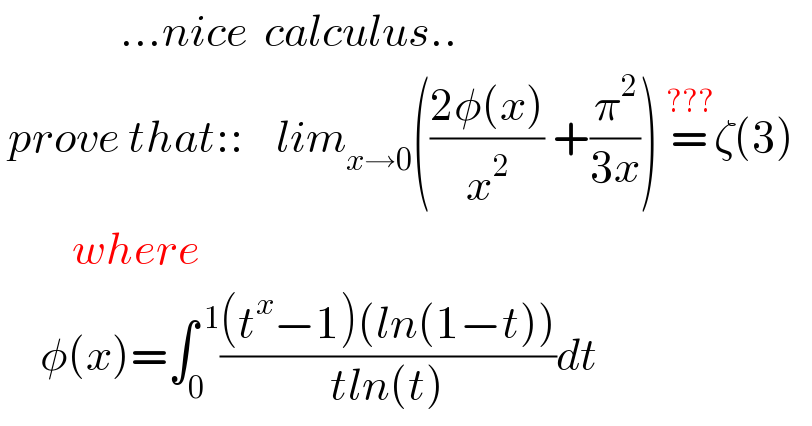
Question and Answers Forum
Question Number 123687 by mnjuly1970 last updated on 27/Nov/20

Answered by mnjuly1970 last updated on 28/Nov/20
![solution: φ(x)=−∫_0 ^( 1) {((t^x −1)/(ln(t)))Σ_(n=1) ^∞ (t^(n−1) /n)}dx =−Σ_(n=1 ) ^∞ (1/n)∫_0 ^( 1) ((t^(x+n−1) −t^(n−1) )/(ln(t)))dt =−Σ_(n≥1) (1/n)[ln(x+n)−ln(n)] =−Σ_(n≥1) (1/n)ln(((x+n)/n))=−Σ_(n≥1) (1/n)ln(1+(x/n)) =−Σ_(n≥1) (1/n)Σ_(m≥1) (((((−x)/n))^m )/m)=Σ_(m≥1) (((−x)^m )/m)Σ_(n≥1) (1/n^(m+1) ) ∴ φ(x)=Σ_(m≥1) (((−x)^m ζ(m+1))/m) =(((−x)^1 )/1) ζ(2)+(x^2 /2)ζ(3)−(x^3 /3)ζ(4)+... ⇒((2φ(x))/x^2 )=ζ(3)−((2ζ(2))/x)−((2x)/3)ζ(4)+... ⇒2((φ(x))/x^2 )+(π^2 /(3x))=ζ(3)−((2x)/3)φζ(4)+... limit from both sides as x→0... lim_(x→0) (((2φ(x))/x^2 )+(π^2 /(3x)))=ζ(3) ✓✓ m.n.](Q123832.png)
| ||
Question and Answers Forum | ||
Question Number 123687 by mnjuly1970 last updated on 27/Nov/20 | ||
 | ||
Answered by mnjuly1970 last updated on 28/Nov/20 | ||
![solution: φ(x)=−∫_0 ^( 1) {((t^x −1)/(ln(t)))Σ_(n=1) ^∞ (t^(n−1) /n)}dx =−Σ_(n=1 ) ^∞ (1/n)∫_0 ^( 1) ((t^(x+n−1) −t^(n−1) )/(ln(t)))dt =−Σ_(n≥1) (1/n)[ln(x+n)−ln(n)] =−Σ_(n≥1) (1/n)ln(((x+n)/n))=−Σ_(n≥1) (1/n)ln(1+(x/n)) =−Σ_(n≥1) (1/n)Σ_(m≥1) (((((−x)/n))^m )/m)=Σ_(m≥1) (((−x)^m )/m)Σ_(n≥1) (1/n^(m+1) ) ∴ φ(x)=Σ_(m≥1) (((−x)^m ζ(m+1))/m) =(((−x)^1 )/1) ζ(2)+(x^2 /2)ζ(3)−(x^3 /3)ζ(4)+... ⇒((2φ(x))/x^2 )=ζ(3)−((2ζ(2))/x)−((2x)/3)ζ(4)+... ⇒2((φ(x))/x^2 )+(π^2 /(3x))=ζ(3)−((2x)/3)φζ(4)+... limit from both sides as x→0... lim_(x→0) (((2φ(x))/x^2 )+(π^2 /(3x)))=ζ(3) ✓✓ m.n.](Q123832.png) | ||
| ||